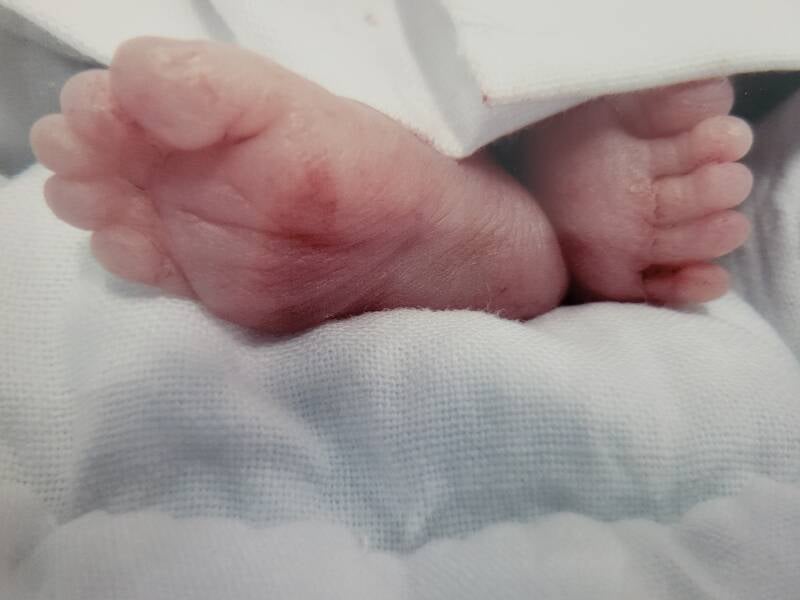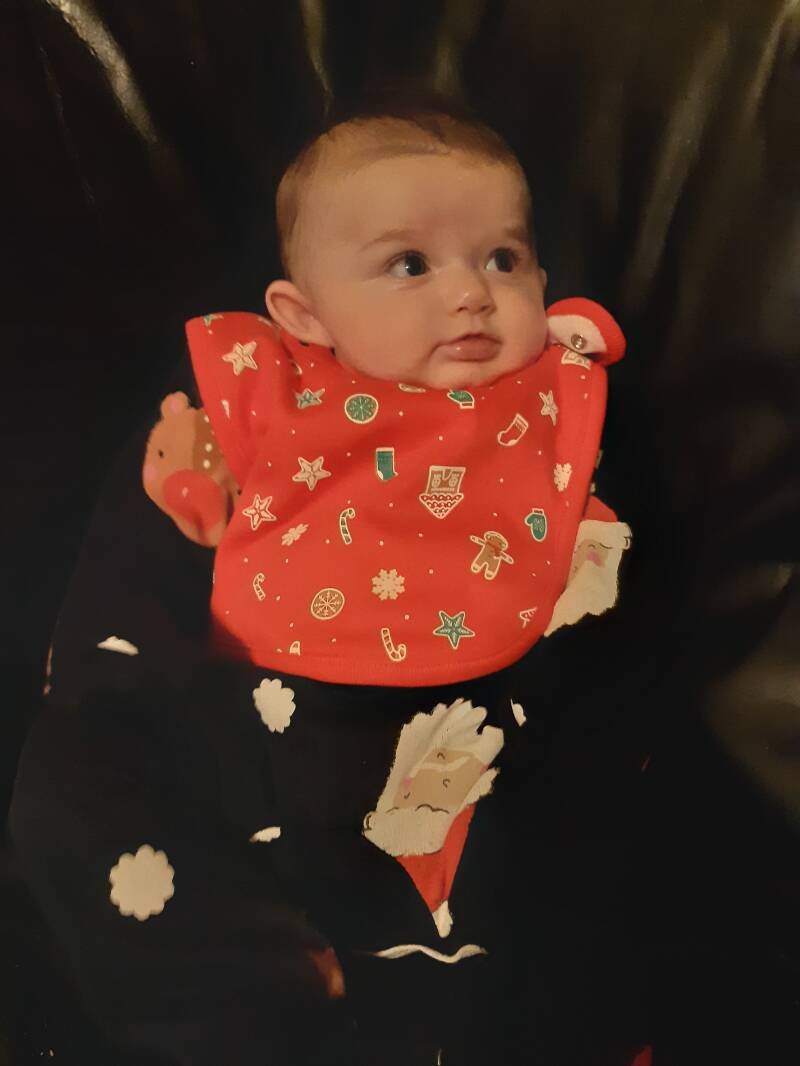HOUSE OF HORROR

30 Findhorn Place: A Family’s Twelve Years Among Hidden Dangers
We are the Wylie family. For twelve years, we lived at 30 Findhorn Place, Troon (KA10 7DJ) with our ten children. The property was owned by our landlord, Professor John McKendrick of Glasgow Caledonian University, a man known publicly for his work on poverty and childhood.
Our experience tells a very different story from the one McKendrick presents in public. While he spoke about poverty in theory, our children lived through its consequences. Hospital records noted environmental factors in the serious health problems they suffered inside this neglected home.
Our daughter Iona died at just eleven weeks old in a house so cold and draughty that even with £150 a week spent on heating, it could not keep her safe. Earlier, during a six-month period when McKendrick left us with no boiler and no hot water, our daughter Sia was born prematurely at 23 weeks and could not be saved. Later, another daughter was born with spina bifida, a condition we cannot separate from the environment she grew up in.
These tragedies unfolded not in squalor, but amid hidden dangers: sewage leaking unseen under floors, holes left open in ceilings, windows never sealed, cupboards balanced on rotted wood, and damp creeping into every room. Repairs were delayed, dismissed, or patched so poorly that the risks only deepened.
Only after we left did McKendrick finally renovate, correcting the defects and sealing the house as it always should have been. He made the property safe for sale, but never for the children who once lived there.
This is the untold truth behind 30 Findhorn Place, a home where hidden dangers thrived, and where the public image of a “poverty expert” was built at the expense of our children’s health and lives.

2016: Nusia – Born Too Soon
In February 2016, the boiler at 30 Findhorn Place broke down. We informed our landlord, Professor John McKendrick, immediately. I even suggested a government scheme that could provide landlords with new, efficient boilers. He told us he would “look into it” and get back to us the following Monday.
That Monday never came. For more than six months, our family of five children lived without hot water or central heating. Natalie and I worked ourselves to the bone, running our small business, M&N Kidzstuff, while she held down two full-time online jobs, and still we boiled kettles just to bathe our children.
In the middle of that hardship, Natalie became pregnant with our sixth child. From the very first month, she suffered heavy bleeding. We knew something was wrong, but there was nothing we could do except fight through it, with no warmth in the house, no comfort, no safety.
On 10 August 2016, our daughter Nusia was born at just 23 weeks and 4 days. She could not be saved. Natalie nearly died herself from the blood loss. That day is seared into my memory, grief for the baby we lost, terror that I might lose my wife too, and the crushing knowledge that we had been forced to live in conditions no family should ever endure.
Only weeks later, on 22 September 2016, a Green Deal assessment was carried out at the property. I wasn’t home, and the assessors tried to force their way inside. Natalie, still grieving, still traumatised, stood her ground and refused. Even then, no new boiler was fitted. We went into October still without heating or hot water.
A replacement boiler was eventually installed. But by then it was too late. Too late for us, and too late for our baby girl Nusia. 💔

2016–2018: Loss, Spina Bifida, and a House in Decay
After losing our baby girl, Sia, we were hit with another devastating blow. At the twelve-week scan of our next pregnancy, doctors told us our child had spina bifida. The NHS painted the darkest picture and pressed us to abort. But we refused. Something had caused her disability, and we needed answers.
We already had five healthy children, so our thoughts kept circling back to the environment we were raising them in. We kept a clean home, but beneath the surface, the house was rotting.
One day, we discovered the toilet had been leaking down the waste pipe, unseen, for God knows how long. Sewage had seeped into the structure of the house. When we phoned the landlord, John McKendrick, he sent plumbers to replace the pipe within a week, but there was no cleanup of the contamination beneath the floors. He never came to inspect it himself. He dismissed the seriousness. The plumbers left gaping holes in our kitchen ceiling, exposing the bathroom pipes above. I patched it the best I could, even recreating the coving out of papier-mâché.
But the toilet kept leaking, again and again, for another four years. Each time, the plumbers came back and did a sloppy job. Eventually, I had to buy a whole new bathroom suite myself and pay a proper tradesman to end the cycle.
By then, the damage was done. The kitchen changed at night. Slug trails appeared across the floor. Sometimes, while making bottles for the kids, I stepped on them barefoot in the dark. I told McKendrick. He laughed down the phone: “No, there’s not.” That was gaslighting, plain and simple.
The problems spread. While our newborn daughter lay in intensive care having operations, my uncle stayed at the house to help with the children. He was furious when he saw the state of the rotten kitchen worktops and the crumbling porch. I phoned McKendrick again. He was heading off on holiday but agreed to send his brother with a carpenter.
The carpenter spent five hours just struggling with the broken front door before turning to the kitchen. When he ripped out the units, the truth was laid bare: there were no floorboards at the back of the kitchen. The cupboards had been balanced on scraps of old skirting board that had long since rotted away. The carpenter shook his head in disbelief but was told to patch it, not fix it.
They worked quickly, called it “wear and tear,” and left us with a half-finished kitchen. Cupboard doors missing. Nothing matching. Our children’s friends stopped coming into the house out of embarrassment. I warned McKendrick the problem would happen again if the floor wasn’t replaced properly. He brushed me off.
That gaping hole in the floorboards wasn’t just a structural flaw. It was a wound in our home, letting in rot, damp, vermin, and despair. And all the while, our children were growing up in the middle of it.
Our Life at 30 Findhorn Place, 2018–2025
In 2018, our lives changed forever. We had a disabled little girl to look after, and we learned to live with the mismatched kitchen, the holes in the ceiling, and the endless disrepair. We stopped asking the landlord for help because his attitude was always the same, dismissive, cold, never fixing the root of the problems.
We agreed as a couple: if God sent us more children, we would welcome them. In December 2019, our seventh child, Keiva, was born. The house was already in poor condition, but all I could do was decorate and cover things up. The landlord refused permission for me to rip out the old kitchen flooring, he told me to just lay lino over it. That didn’t solve the health hazards. It only hid them out of sight.
Covid Years
When COVID came, quarantine seemed the safest option with a disabled child. No visitors, no exposure. We thought we were protecting our family, but the house itself became our biggest danger.
In 2021, our daughter Maeve was born. She is autistic, or at least shows strong traits. We cannot help but wonder if the heavy metals in the water, which corroded every kettle in three months, leaving rust inside, played a role. Around the same time, I noticed the windows were never sealed properly on the outside. The frames were missing whatever makes them watertight. By then, I had given up contacting the landlord, his attitude made every complaint feel like an inconvenience to him. Instead, I sealed them myself with weatherproof foam. It barely worked.
The result was staggering energy costs: £150 a week on gas and electricity, just to keep the house livable.
Children Falling Ill
We tried to carry on. I laid new carpets, decorated, and made the best of it. Then our son Corban was born. He thrived, but the house was making the older children sick.
Our teenagers started collapsing. One night, my eldest fainted downstairs. I carried him up, but he wasn’t breathing, I had to bang on his back to bring him round. He had lost control of his bowels. Another time, he fainted in the kitchen, and I caught him just before he hit the floor. My daughter collapsed twice in the bath.
We began to realise: something in that house was poisoning us.
Iona
Then came our biggest heartbreak. My wife became pregnant with Iona. In what I now see as my biggest mistake, we moved ourselves and the toddlers into the downstairs rooms, right beside the rotting kitchen.
For four months, we were constantly ill, battling fevers and exhaustion, trying to keep the babies alive through Christmas. On 6 January, Iona died in her sleep. She was just eleven weeks old. The post-mortem said pneumonia, with traces of RSV and an earlier illness; her heart had never fully cleared.
I rang the landlord and told him straight: the windows had to be fixed. The cold was pouring in, night and day. He promised he would “get on it.” He never did.
We spent the next four months of winter fighting to keep our other toddlers alive, trying to heal them from the same sickness that killed Iona. And where was Professor John McKendrick? Nowhere. He left us in that state for another whole year.
This wasn’t ignorance. He is an academic, a so-called expert on child poverty and public health. He should have known better than anyone that a house with unsealed windows, leaking cold and damp into every room, would destroy children’s health. But he didn’t care. He couldn’t be bothered to put two and two together. My children’s suffering was obvious, but he chose profit and convenience over their lives.
The End of the Tenancy
By the end of 2024, the windows were still not replaced. We spent yet another winter trying to survive, paying astronomical heating bills to keep out the damp and cold. We eventually called Environmental Health, but before they could act, the council moved us into new accommodation. That is how our twelve years at 30 Findhorn Place finally ended.




